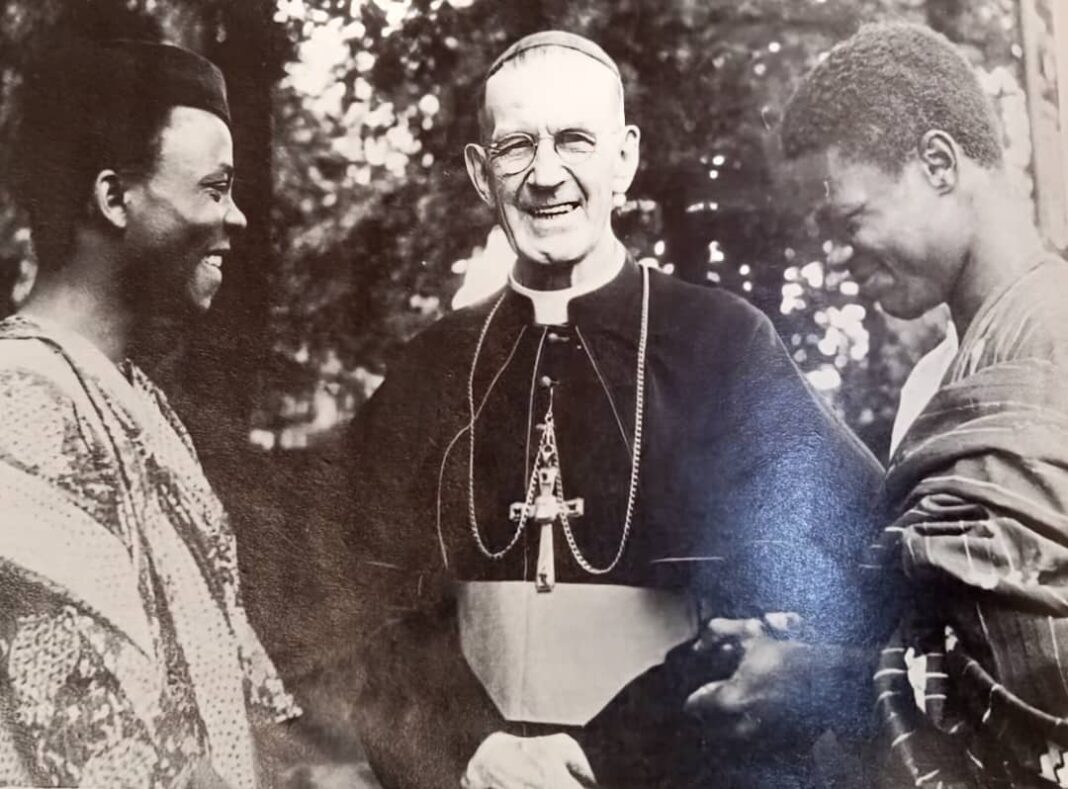Following my impetuousness of daring to table an agenda item for the episcopal plenary, I may prudently conclude this opinion piece whose title has steadily morphed from “Squandering the diamond opportunity of (not) celebrating…” to “(Not) squandering the diamond opportunity…” to its present “Seizing the diamond opportunity”. By examining the rich tapestry of Ghana’s Catholic history, we can glean valuable insights that may guide the task of different groups within the church to seize the prevailing diamond opportunity.
The first group of interest are our bishops, who, as the primary catalysts for the church’s growth, hold a pivotal role. Their historical paradigm is Archbishop William Thomas Porter, S.M.A. Shortly after Porter’s appointment as Vicar Apostolic of Cape Coast, his colleague and S.M.A. confrere, Bishop Hubert Paulissen, described him in the following glowing terms: “Mgr. Porter really is a saintly priest, very zealous, very dignified and a perfect gentleman…I am sure he will operate with tact and prudence and that you will have complete confidence in him”. Besides seeking to embody Porter’s admirable virtues, Ghana’s prelates may find Porter exemplary in three distinctive ways, summarised as his foresighted mentorship, his focus on education, and the expansiveness of his ecclesial vision.
With tremendous foresight, Porter shepherded the fledgling church to the point of facilitating the church’s Africanization with the appointment of the first Ghanaian bishop, John Kodwo Amissah, as his auxiliary in 1957. He had considered other potential successors, such as Frs. Essuah, Buah, and Lejeune. Eventually, the lot fell on Amissah, whom Porter then progressively mentored, such that after three years, the former succeeded the latter as Metropolitan.
At last count, about a quarter of Ghana’s active bishops would have retired or would be due for retirement by 2030. How the wisdom of decades of episcopal experience passes on to the next generation of Ghana’s Catholic Church leadership is a matter of interest. What structures are in place or may need to be developed to facilitate effective mentoring of Ghana’s upcoming Catholic leaders, recalling that in this era of synodality, such formation should target not only their brother bishops and priests but also the laity. The bishops approaching retirement may ponder an aphorism Pope Francis emphasises: Time is greater than space. As the Holy Father writes in Evangelii Gaudium, this “means being concerned about initiating processes rather than possessing spaces”. Simply put, it is about securing enduring goals that outlast one’s transient role.
One such process Porter recognised as constitutive of his mandate and was decisive in his appointment is education. Porter, who previously was in charge of Catholic schools in Nigeria, delivered on this mandate excellently, fulfilling the yearnings of Gold Coast Catholics for their church to provide education for their members. Today, it is gratifying to witness that quest for quality education manifested by Ghana’s Catholic hierarchy, evidenced in the recently concluded 2nd National Catholic Education Forum.
Porter’s attention to education was an outgrowth of his third distinctive trait: an expansive ecclesial vision. In this regard, Porter challenges Ghana’s present-day Catholic hierarchy to eschew the parochialism of a disproportionate focus on their respective dioceses, particularly at the expense of the wider Catholic Church in Ghana, represented by the Ghana Catholic Bishops’ Conference. Embracing the larger picture aligns with yet another axiom of Pope Francis: the whole is greater than the part. This view underscores the importance of collective ecclesiastical leadership in ensuring quality seminary formation and the sustainability of the Catholic University of Ghana, among other shared projects. Furthermore, it impels action by the more endowed dioceses on behalf of the less endowed, particularly vis-à-vis the provision of human and other resources, recognising that when one member suffers, all suffer with it (1 Cor. 12:26).
Therefore, it may be appropriate that, within the context of this diamond jubilee celebration, Ghana’s bishops identify clear, measurable targets with a five-year achievement timeline. Should these objectives, specific to crucial areas and sectors of the church’s life, be backed by clinical execution, it would guarantee that the sesquicentenary of the Catholic mission in Ghana would celebrate both older and more recent achievements. The potential impact of achieving such targets is immense, as it could bolster confidence and enhance the motivation of the shepherds and their flock regarding the prospects and challenges of the future.
Sir James Marshall and a less well-known figure, Master Francis Haizel Cobbenah, serve as the historical exemplars for the next group of interest. They symbolise the church’s intellectual and catechetical traditions, respectively. A more detailed discussion than space permits now will explore what significance may be attached to Marshall and Cobbenah vis-à-vis conceptualising Catholic resurgence in Ghana. Subsequent essays will focus on other historical figures, such as James Gordon, an early Fante convert Sir James Marshall chaperoned and who later assisted Moreau and Murat in evangelising his people. It suffices to mention these points now and promise to develop reflections based on them in later opinion pieces, hoping to whet keen intellectual appetites with this assurance.
To conclude, therefore, on a biblical note, it says of Herodias, who was married to Philip and then notoriously to his brother Herod and whose treachery led to John the Baptist’s death, that she had an opportunity (Mark 6:21). She took it! Few things commend Herodias. But to a church currently challenged by its growth indicators, in addition to deepening our prayer life and Christian witness, as Cardinal Peter Turkson has wisely counselled, it seems right and just that, with the alacrity and tenacity of Herodias, we seize every healthy prospect that comes our way, beginning with this diamond opportunity.
By Rev. Fr. Kpanie Addy, S.J.
addy@jesuits.net



